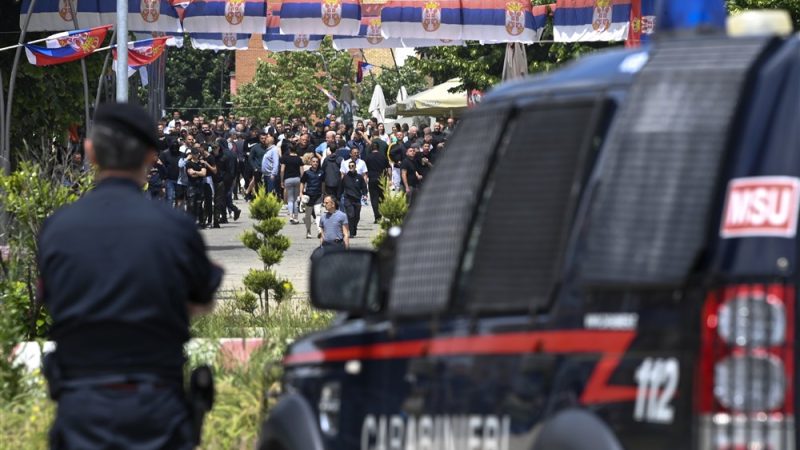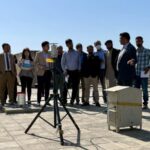The EU is set to hold crisis talks this Thursday (22 June) with Kosovar Prime Minister Albin Kurti and Serbian President Aleksandar Vučić, as Brussels seeks to ease tensions after a week of back and forth over a possible meeting between the leaders.
“ I have summoned the leaders of Serbia and Kosovo to Brussels for urgent meetings in order to find a way out of the current crisis ”, declared the head of EU diplomacy, Josep Borrell.
“We need immediate de-escalation and new elections in the north with the participation of Kosovo Serbs. This is essential for the region and the EU , added Mr. Borrell.
The call for talks came after the latest escalation between the two sides, namely the arrest last week of three Kosovar police officers by Serbia. This event came after weeks of tensions linked to disputed elections in the north of Kosovo with a Serb majority.
Numerous clashes have injured NATO peacekeepers and protesters, and led to attacks on journalists and police. In addition, several Serbs were arrested, including one for allegedly organizing attacks against KFOR, the NATO mission in Kosovo.
The EU and US have threatened both sides with “negative consequences” if tensions do not dissipate. The criticism has been directed more at Mr Kurti than at Serbian President Aleksandar Vučić, whom northern Kosovo Serbs consider their leader despite Kosovo’s declaration of independence in 2008.
The Westerners had notably mentioned sanctions against Kosovo, ranging from the freezing of EU funds and assistance, the reduction of diplomatic meetings and, according to multiple EURACTIV sources, the potential halt to the implementation implementation of visa liberalization for Kosovar citizens.
The Union also warned last week that without a de-escalation of the situation in northern Kosovo, there was no room for the continuation of the EU-facilitated dialogue process between Belgrade and Pristina.
Thursday’s talks in Brussels as part of the EU-facilitated dialogue also represent a step back in the process that earlier this year moved away from crisis management towards negotiations on the implementation of an agreement.
It was not yet clear whether MM. Kurti and Vučić will meet only bilaterally with the European side or also on a three-way basis, as has been the case in previous meetings within the framework of the EU-facilitated dialogue.
A solution must be found by the end of the year, before the US and European elections in 2024 divert attention, said the Union’s special representative for dialogue between Belgrade and Pristina, Miroslav Lajčak, at an event on Tuesday (June 20).
“Either we have agreed solutions or we have confrontation and unilateral actions on both sides,” Lajčak stressed.
“In this case, we are heading towards serious, very serious escalations and violence,” he added.
“ There is no other option than de-escalation and a return to dialogue — and I must say that the transatlantic community is very united on this point ”, declared Gabriel Escobar, American special envoy for the Western Balkans, during of the same event.
“The idea that one of the two leaders is going to put conditions on a plan that has been carefully developed by the EU in coordination with the United States, I think is reckless,” added Mr. Escobar.
Prior to the meeting, Vučić said he would attend the meeting until the detained Serbs were released and Kosovo reduced police presence in Serb-majority municipalities.
Meanwhile, Pristina insists on the immediate release of three police officers who were “kidnapped” on Kosovo territory. Belgrade, on the other hand, claims that they were arrested on Serbian territory for legitimate reasons.
“To say ‘no’ to the invitation of the EU would really be a very serious and very negative act — therefore, the meeting will take place,” said Mr. Lajčak.
“What is extremely important is de-escalation, because there can be no process of normalization as long as there are hundreds or even thousands of people on the streets,” he added.
Escobar said Washington was “ready to act very quickly to implement the Ohrid Promise, to bring Kosovo closer to Europe and NATO, to attract more investment to the region, including in Serbia”.
But that won’t be possible “if we don’t cooperate and if we don’t have a common vision, and for now, I’m afraid that’s not the case”, he added.
It is not yet clear whether the two leaders will meet face to face or hold separate talks with Mr. Borrell. On Thursday, Mr Vučić told public broadcaster RTS that he would not negotiate with Mr Kurti. “I have nothing to say to him,” he said.
This article is originally published on euractiv.fr









